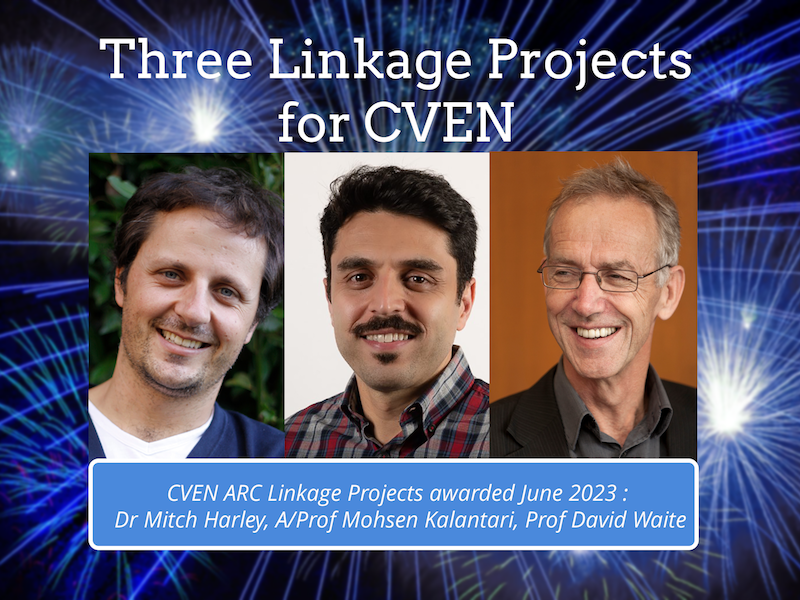CVEN Linkage Success – for life saving and other transformational technologies!
 The School of Civil & Environmental Engineering has secured three new ARC Linkage Project (LP) grants with a total value of $1.13 million in the latest round of LPs announced in June 2023, totalling one third of successful UNSW grants.
The School of Civil & Environmental Engineering has secured three new ARC Linkage Project (LP) grants with a total value of $1.13 million in the latest round of LPs announced in June 2023, totalling one third of successful UNSW grants.
Huge congratulations to our Chief Investigators UNSW Scientia Fellow Dr Mitchell Harley (Water Research Laboratory), Associate Professor Mohsen Kalantari (Centre for Infrastructure Engineering & Safety), and Scientia Professor T David Waite (Water Research Centre/ Centre for Transformational Environmental Technologies), for achieving these highly sought after ARC grants – this round had an application success rate of only 27%.
Congratulations also to their industry partners Australian Spatial Analytics Ltd; Geoscience Australia; Geological Survey of Western Australia; Geological Survey of NSW; Department for Energy and Mining; Department of State Growth; and Surf Life Saving Australia Limited
Detail of the successful grants are:
LP220200780 A smartphone rip-detection tool to improve rip current awareness.
Dr Mitchell Harley; Associate Professor Yang Song; Dr Imran Razzak; Dr Jasmin Lawes; Professor Robert Brander; Professor Toby Walsh; Dr Amy Peden; Mr Shane Daw
Industry Partner: Surf Life Saving Australia Ltd
Grant Awarded: $342,924.00
About: This project aims to develop a smartphone rip-detection tool and online education game to help reduce the number of Australians drowning in rips each year. The project expects to develop an optimised deep learning algorithm to detect rips from smartphone video taken at Australian beaches, which can then be used by Surf Life Saving Australia for training and education. Expected outcomes of this project are enhanced identification and literacy of rip currents, particularly among priority high-risk demographics like young males, culturally and linguistic diverse communities and rural visitors. This should provide significant benefits in reducing rip-current drowning and rescue incidents in Australia, particularly at unpatrolled beaches.
LP220200901 Reconstructing land tenure maps of Australia in 3D.
Associate Professor Mohsen Kalantari; Professor Dr Sisi Zlatanova; Ms Prudence Lawrence; Ms Samantha Garbutt
Industry Partner: Australian Spatial Analytics Ltd
Grant Awarded: $173,220.00
About: Existing land tenure maps of above and below ground, such as apartment ownership, tunnels, and mining, are maintained using 2D drawings. However, the drawings are not structured and valuable for detailed and advanced visualisation, analytics, and simulation, which are essential for testing potential interventions and policy development. This project aims to develop a data validation framework for transforming current drawings and reconstructing them into 3D models. The outcomes include validation principles, formal mathematical terms, and computational algorithms. Benefits include a cost-effective onshore alternative to offshore 3D reconstruction practices, efficient land development and infrastructure planning, and fewer property disputes.
LP220200912 Hydrogen generation by subsurface iron mineral transformations.
Professor David Waite; Professor Ryan Armstrong; Dr Andrew Feitz; Dr Peter Haines; Ms Elinor Alexander; Dr Kevin Ruming; Mr Ralph Bottrill
Industry Partners: Geoscience Australia; Geological Survey of Western Australia; Geological Survey of NSW; Department for Energy and Mining; Department of State Growth TAS
Grant Awarded: $612,689.00
About: The aim of this project is to elucidate key factors responsible for natural hydrogen generation in Australian subsurface environments. Large amounts of this valuable resource are produced naturally with estimates of production rates of this “gold” hydrogen at least 100 times the annual demand for this critical resource. Based on improved understanding of the source of natural hydrogen, predictive tools will be developed that will assist in assessing the viability in Australia of hydrogen exploration and engineered retrieval. Ready access to naturally produced hydrogen could enable Australia to replace hydrogen that is currently generated via the use of unabated hydrocarbons.



